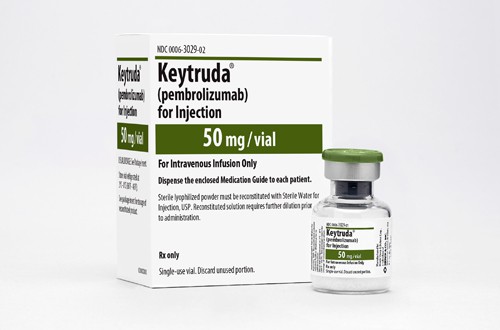
While Keytruda has been wowing with impressive new results at ASCO over the last few days, UK cost effectiveness watchdog NICE and NHS England are among the the hardest market access gatekeepers to persuade.
However, today MSD (Merck & Co. in the US) and Keytruda (pembrolizumab) have achieved a major milestone, gaining approval for full routine use on the NHS in England in first line treatment of metastatic non-small cell lung cancer (NSCLC).
This means it will now be removed from the ‘managed access’ Cancer Drugs Fund (CDF), the first drug to achieve this since the remodelled system was launched two years ago.
But NHS England has insisted on asking for further price discounts – and while these are confidential, they will be substantial, up to 50% of the list price in some earlier cases. Keytruda is the first drug to go through NICE’s England’s Budget Impact Test, which allows NHS England to re-open pricing talks on any treatment which will cost the health service more than £20m ($26m) over three years.
This makes today’s announcement a double first for Keytruda and the NHS – and permits both the pharma company and NHS England to declare the decision a ‘win win’.
NICE’s draft decision was based on MSD’s Keynote 024 study, which first produced overall survival (OS) data in June 2017.
This shows that Keytruda extends life on average by 16 months more than standard chemotherapy for PD-L1 positive patients, a huge gain in this hard-to-treat disease.
The draft recommendation means more people will have an automatic right to the drug on the NHS 30 days after NICE publishes final guidance later in June, which will confirm its dominance among the new immunotherapy treatments in first and second line NSCLC treatment.
While the ruling will be welcomed by all sides, it is by no means speedy – NICE made today’s decision on the Keynote 024 overall survival data which was unveiled on 5 June 2017. This means the data had been available more than three weeks before NICE made its decision last year, but considered OS data with an earlier cut-off date, which it concluded retained uncertainties.
Around 1,800 patients a year will be eligible for the drug. It costs on average, £84,000 for a course of treatment but MSD have offered the aforementioned confidential discounted price.
NHS England’s chief executive Simon Stevens rarely comments on NICE decisions, but this Keytruda ruling is a major step forward for lung cancer care.
He said: “This is another milestone in our rapidly improving modern NHS cancer care. This win-win deal for patients and taxpayers brings genuine innovation and proven survival gains to cancer patients across England.”

Louise Houson, UK Managing Director, MSD (pictured) said: “Today’s news on funding for pembrolizumab as a first-line lung cancer treatment in relevant patients is a tribute to the partnership we have all achieved and another great step forward.”
As in other major markets, the decision confirms Keytruda’s lead over its rivals, especially in lung cancer, the most lucrative therapy area. It’s nearest competitor in front line NSCLC treatment is Tecentriq, however in England Roche’s drug has only just received NICE approval for use in second line lung cancer.
Nevertheless, NHS England will be keen to see Tecentriq gain frontline NICE approval in lung cancer, which will allow it to exert more pressure on prices. Also on the horizon is the prospect of treatments combining PD-1/PD-L1 immunotherapies and other novel drugs, which could improve outcomes for patients but also add in extra costs.




